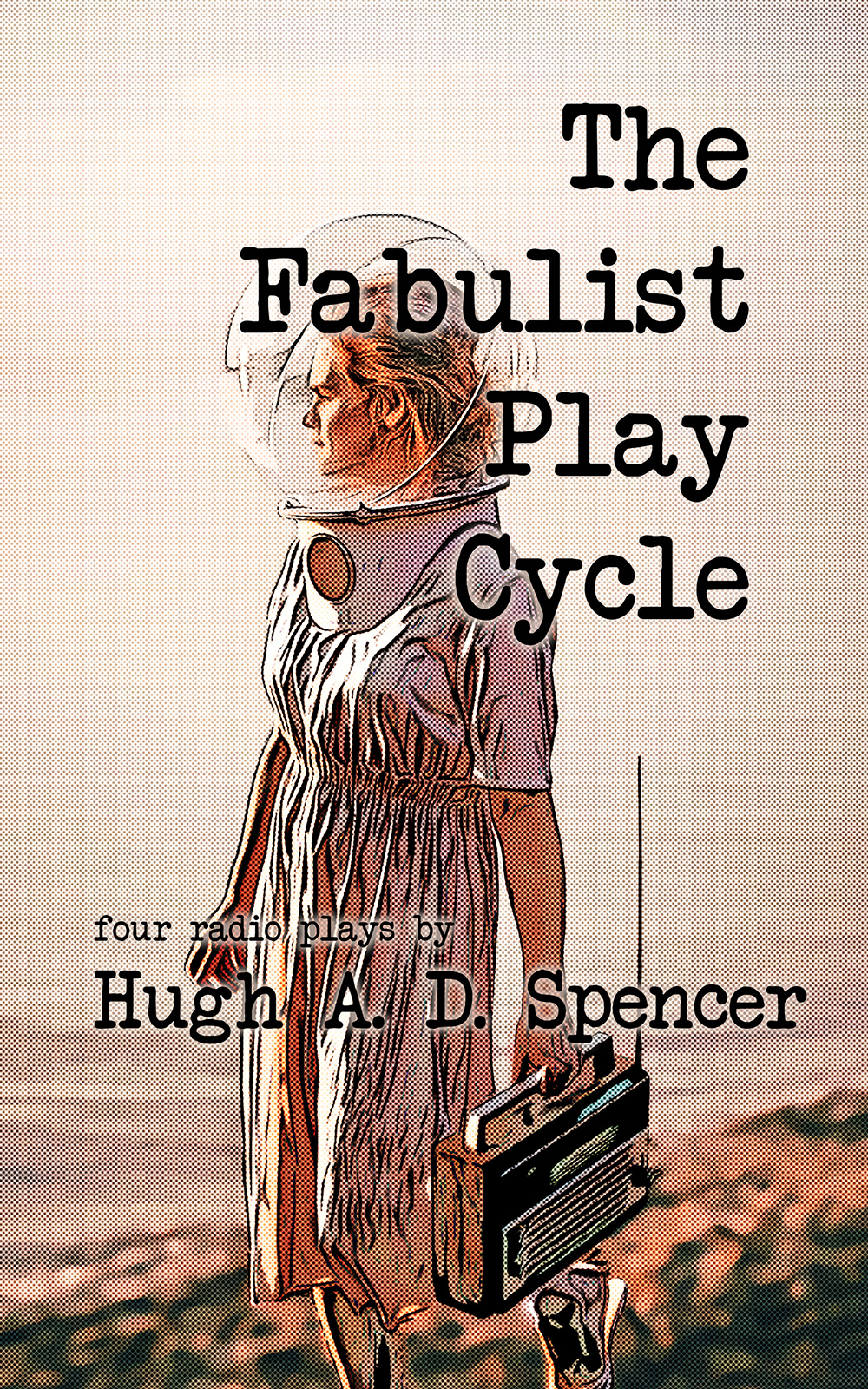
OBIR: Occasional Biased and Ignorant Reviews reflecting this reader’s opinion.

The Fabulist Play Cycle: a radio play collection – by Hugh A. D. Spencer
Publisher: Brain Lag, Milton, Ontario, Canada, 2023.
Cover Art: “Calling Occupants of Interplanetary craft” by Terry Draper and John Woloschuk.
Note: All Radio Plays by Hugh A. D. Spencer
Amazing Struggles
Premise:
Teenagers in the 1930s/40s compete with established pros to sell stories to the eccentric editor of the most popular science fiction pulp magazine in America.
Review:
This radio play is all about how to make history entertaining.
There are two kinds of people who will enjoy reading it: those who know everything about early North American science fiction, and those who know nothing.
I belong to a generation of fans whose situational awareness of the context of prehistoric fandom is at once both universal and familiar, in that it fits us like a pair of comfortable old slippers. I am an extreme example of such, in that I assume my fellow enthusiasts will catch the reference to Harry Warner Jr.’s opinion of Canadian fan Leslie A. Coutch’s fanzines in my mere mention of “comfortable slippers.”
To which you, the reader, might rear back in worry that I’m going to plunge you into a maelstrom of excessively detailed minutiae elevating boredom to an existential crisis. Fear not, for apart from these opening paragraphs, I do not intend to drag you into the abyss, even though I certainly could, given my fannish background.
You see, for a couple of decades I used to be a fannish historian, doing original research, consulting not only the classic works in the field by Jack Speer, Sam Moskowitz, Harry Warner Jr., Francis T. Laney, Garth Spencer, Taral Wayne and others, but also numerous original fanzines and even the original participants themselves (if they were still alive). Standing on the shoulders of giants, I published the ”Canfancyclopedia,” a summation of my research in fannish history with an emphasis on the Canadian contribution, including a comprehensive fanzine index covering just about every 20th century Canadian fanzine. All my efforts culminating in a 2010 Fan Achievement Aurora Award for WCSFAzine, a clubzine primarily devoted to my fannish research. Oh yes, without any doubt, I am well equipped to bore you to tears.
Fortunately, that is neither my nor Hugh’s intention. The play reads like a sprightly parody, humorous and silly, light-hearted to the point of reminding me of the kind of humour found in early Mad Magazines. Ignorance on the part of the reader is no handicap. The play is wonderfully entertaining.
Besides, the bulk of my aging memory has slipped into my subconscious, so that a detailed analysis referencing past “characters” and events is impossible. I am forced to confine my remarks to generalities. Good thing too, or else I would give too much away.
Still, I can reveal enough to convince you that the themes and people are not wholly imaginative constructs but wry parodies of actual people and their quirky obsessions. For example, I can tell you that the pimply-faced teenage writers who call themselves “The Fabulists” are obviously based on the legendary “Futurians” of New York fame. One of them, Sheldon Isaacs, both incredibly young and incredibly naïve, stands in for Isaac Asimov, the youngest of the Futurian crowd.
Politics dominated the era of “First Fandom.” Some fans today complain about the level of “Wokeness” in fandom and science fiction. I mean, Great Galloping Ghu! Back in the 1930s a number of prominent fans not only belonged to the Communist party but were fervent supporters of Stalin! The great Fredrick Pohl himself referred to his political views at the time as his “Boy-Bolshevik period.” In contrast, another fan advocated Italian Fascism, even after the allies won the war. This alone should tell you how truly naïve fans were back then.
Not surprising, really, given these kids grew up in the great depression and, along with many members of the general public, were disillusioned with capitalism and tended to suspect other “isms” offered a better future, and fans were enthusiastic advocates of an inevitably better future (the fools), so easily subverted by simplistic propaganda.
So, a couple of characters in the play are keen on socialist views, to the point of advocating “Mitchellism,” which is a parody of the actual “Michaelism” movement offered to the masses at the first World SF Convention held in 1939. You’ve never heard of it? Shows you how influential that so-called movement was. Just a brief outburst of enthusiasm on the part of a few Futurians. As ephemeral as a Mayfly.
Now, the great and god-like editor worshipped by the teenage characters who devoutly faunch (a fan-slang term) to sell their stories to, Stewart D. McReady, is probably a combination, a summation if you will, of the prominent editors of the day, from Hugo Gernsback to (mostly) John W. Campbell. He runs “Tremendous Stories of Super Science” with a relaxed, arbitrary fist, fiercely devoted to the status quo of clichéd pulp fiction to guarantee the almost-profitable status of the magazine, but open to crackpot interpretations of science, especially mind-enhancing philosophy such as ”Mentotechnics,” which might, in theory, expand mankind’s something or other. This ties in neatly with the prevalent belief among fans that they represented the next step in human evolution and were bound to become the arbiters of the world’s future. Too pretentious and absurd for you to accept? On the contrary, exactly the mood of fandom at that time. This “parody” is, in broad theme, 100% historically accurate.
Which is why the established writers in this play are a hoot. One is even more verbose than I am, always using two big words when one short word would do, and constantly demanding pedantic precision from his fellow writers in their speech, let alone their writing. Several candidates spring to mind. And then there’s Evanston, who appears to suffer from Baron Munchhausen disease, constantly competing with himself to tell the most outrageous claims of personal achievement no matter how unbelievable or contradictory, and this can only be one very famous individual in particular. I am confident you will figure out who he is. He still has many fervent fans.
And, of course, a certain FBI raid during WWII is described, or at least satirized. It actually happened. Fair to say that extremely serious real-time concerns outweighing the petty politics of fans occasionally intruded into their idealist mindset. The section ends with a splendid example of real-life futurism impacting the world infinitely beyond the pretensions of fandom.
The play is divided into multiple scenes, each accounting for a period of personal growth in terms of teenagers slowly and reluctantly maturing, with an overview provided by the narrator, Fabulist Bob Clyde. This system works well. The essence of the era is neatly encapsulated in a highly entertaining and amusing fashion.
Astonishing Failures
Premise:
The Fabulists, having grown into young adults, are now forced to work for a living.
Review:
This interrelates several themes in a most incestuous manner: the shock of going “Filthy Pro” and pandering to the unintelligence of the masses (as defined by commercialism), fannish marriages as ephemeral as “Mitchellism,” and the relentless success of Evanston’s books and lectures on “Mentotechnics” despite opposition from genuine specialists and legal authorities.
Particularly striking is McReady’s drastic editing of contributor’s manuscripts to bring them into line with his fanatical advocacy of the virtues of “Mentotechnics.” Some very choice bits of purple prose are quoted, which are purple to the point of being beyond the visible spectrum, yet can hardly be said to exaggerate the worst writing of the era so much as reveal it in all its glory. And Ghu (a fannish ghod) knows, J.W. Campbell’s advocacy of numerous pseudosciences to the detriment of the entertainment value of the stories he published is well reflected in McReady’s extraordinary mental gymnastics.
A scene where a jaded former Fabulist advises a young Rod Serling on the proper way to write science fiction is a hilarious example of the “real” SF world incorporated into the parody. This technique helps convince the reader everything rings true.
One aspect which particularly appeals to me is the newly adult Sheldon Isaacs morphing into a combination Isaac Asimov and Sam Moskowitz, the latter in real life known as the “Newark Neanderthal” for his opposition to the Futurian political shenanigans in the past, but also for his adult career as a doughnut research specialist. This provides Sheldon’s character with an opportunity to demonstrate his extreme love of science, albeit in a very narrow field, to long-suffering students at the technical institute where he teaches. After all, the real Asimov was not only a workaholic but a thinkaholic. This Hugh well illustrates.
There’s also a nice bit with one writer typing his predictions on how horrible a dystopia the future will be while ignoring a radio news broadcast revealing how horrible the contemporary reality was what with the Korean War and Macarthy’s witch hunt. The contrast exhibits the best and worst of the role of science fiction. On the one hand, extrapolate from today’s events to warn about current trends. On the other, offer pure escapism as a refuge from reality. Question is which is the best and which is the worst?
Thus this parody continues its realistic appraisal of the evolution of science fiction and its fandom through the 1950s.
Disappointing Success Part I
Premise:
It’s the 1960s. Science fiction earns big bucks, but only for Sheldon Isaacs.
Review:
This section begins with hilarious quotes from “The Martian Messiah,” which is a spoof of a famous and influential novel I’m sure you are familiar with. And much is said re: the most popular SF TV show of the decade, “Space Spanners,” a show of great promise continuously assaulted by the forces of mediocrity. Again, I am confident you will know the identity of the show and appreciate the satire aimed of its infamous struggle to keep going.
“Space Spanners” serves the main theme of disillusioned Fabulists. Yes, they’re making a living, but at the expense of the purity of what they used to see as the future of science fiction literature. Turns out commercial success requires, indeed demands, an emphasis on competition and adventure, not to mention sex and violence. You can hint at the world/universe becoming wonderful but it better be exciting and involve fisticuffs to solve problems. The Fabulists are pleased and ashamed at the same time, and the mental convolutions they go through with themselves and each other to justify their “betrayal” of their youthful ideas are a joy to behold.
Meanwhile Evanston has advanced the science of “Mentotechnics” into the religion of “Mental Technology” and taken on the role of its Messiah. Amusingly, he has taken refuge in Canada in a rather striking fashion and there are several chuckle-worthy scenes where a committee of the Ontario Parliament attempts to figure out what he’s up to. It is a good expose satire of the actual cult in question and reveals much of its activities in a scarcely exaggerated parallel form.
In the course of this play Hugh gives an explanation for the ongoing success of the cult which makes perfect sense. It’s something I never thought of before, but I believe he’s right. I’ll just say it puts everything in its proper, accurate perspective.
Again, virtually every line is written to amuse and amaze, yet it’s bang on accurate in its overall account of the actuality of the decade.
Disappointing Success Part II
Premise:
In the 1980s Science Fiction earns billions of dollars and the surviving Fabulists are keen on getting their share.
Review:
Sheldon Isaacs has become ridiculously successful but has found a cure for his workaholicism. He has learned to take full advantage of being a corporate entity. The other Fabulists cling to the coattails of numerous “Star Spanners” films. Occasionally contemporary fans reawaken Fabulist’s memories of their 1930s idealism, sometimes painfully, but they’re too jaded to care.
Evanston is dead, but his influence lives on.
In general every aspect of the contrast between 1930s fannish idealism and how their future actually turned out is meticulously explored. Isaacs sums it up with a definition of modern science fiction written by aging Fabulists that is bang on target. Take it as truth. It explains everything about old-time writers and old-time fans. And to add my own opinion, fortunately, the new generation pays no attention. They’re too busy being creative and imaginative in a wholly original fashion that owes little to the past. That’s a good thing. Still, I cherish the old ways. Call it mental comfort food.
Cult Stories
Premise:
Evanston may be dead, but he is actively directing the followers of “Mental Technology” toward his ultimate goal.
Review:
Even better, the final crisis takes place in Canada. CSIS is involved, and Star Trek Fans (ST being a rip-off of “Star Spanners” that is gaining in popularity).
Part of the humour involves a graduate student trying to decide if his thesis should be about Evanston’s cult or about another cult, Star Trek Fandom. Research in either case is fraught with difficulty.
The final confrontation is delightfully wacky and totally off the wall, but darned if it doesn’t seem plausible given the nature of the cult. Makes one wonder.
Note: My ARC (Advance Review Copy) does not include the forward by Dr. Allan Weiss of York University which will be included in the published version. He is the author of “The Routledge Introduction to Canadian Fantastic Literature,” a summation of Canadian Speculative fiction from 1837 to the modern day. I imagine he has a lot of informed opinion about the significance of this collection. You can find my less informed opinion below.
CONCLUSION:
As I stated, you don’t need to know anything about the history of science fiction fandom or literature in order to enjoy this book. It’s a hoot. But you will grasp the essentials of its history by the time you finish.
It’s really about the generation that spawned Pulp Science Fiction and First Fandom. These writers and fans remained influential in the evolution of the genre through to the turn of the century. Now, increasingly, they are becoming irrelevant. If only because many of them are dead. The torch is finally being passed to a totally new generation largely ignorant of what one teenage fan told me a few years back was “20th century junk.” Sigh. This is the nature of things.
The joy of this book is that it tracks the evolution of enthusiastic futurism through multiple phases of success/disillusionment which nevertheless had both positive and negative impact on literally millions of people who had no understanding of the origins but enjoyed the results. Though the egos and shenanigans are front and centre, ultimately, it’s about the endless quest for “the sense of wonder” which motivated all involved. Truth is fandom was and is “mostly harmless” and often a heck of a lot of fun. That’s why so many of the surviving fans feel such nostalgia for this past. It was kind of glorious, in its often petty and absurd manner, but may cared and cared deeply. The ghost of their sense of community is still floating about, a fading influence, but nevertheless a kind of living treasure while it lasts. Not a bad legacy for a generation.
But the main reason you should read this book is it is as funny as hell. A lot of thought went into noting the humour inherent in the activities and pretensions of First Fandom and, as I said early, this led to the creation of what strikes me as sharp satire equivalent to the best work in early issues of Mad Magazine when it was still a comic book.
Even better, forewarned that the characters and events, no matter how outrageous and silly, are based on real people and what they actually did, you’ll find this collection all the more pleasant and exciting to read. Not laugh-out-loud exactly, but much chuckling and wry smiling as you turn the pages. Shake your head stuff. Seemingly unbelievable, but distressingly and hilariously true. Well, not literally true, in that everything is presented in an alternative parallel universe manner, and yet, and yet, in terms of trends, an excellent summation of what actually happened.
Point is I had a really good time reading this book. I think you will too. Its great fun.
“The Fabulist Play Cycle” will be available for purchase starting Jan 12, 2024, but you can pre-order it now at: < The Fabulist Play Cycle >










